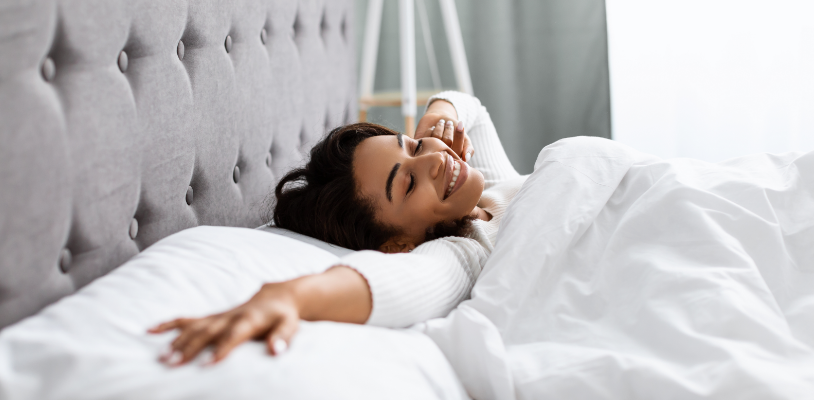If you’re struggling to fall asleep or stay asleep, you’re not alone. Many Americans experience sleep issues, leading to fatigue, irritability, and decreased productivity. While prescription medications are available, they often come with side effects and the risk of dependency. Fortunately, several natural remedies can help improve sleep quality without these drawbacks. Here are some effective natural sleep aids you can try tonight.

1. Melatonin Supplements
Melatonin is a hormone that regulates the sleep-wake cycle. The body naturally produces it in response to darkness, signaling that it’s time to sleep. However, exposure to artificial light at night can disrupt melatonin production. Taking a melatonin supplement may help reset your internal clock, especially if you have jet lag or work night shifts. It’s generally recommended to start with a low dose, such as 1–3 mg, taken 30 to 60 minutes before bedtime. Always consult with a healthcare provider before starting any supplement regimen.
2. Magnesium-Rich Foods and Supplements
Magnesium is a mineral involved in over 300 biochemical reactions in the body, including those that promote relaxation and sleep. It helps regulate neurotransmitters that calm the nervous system. Foods rich in magnesium include almonds, spinach, black beans, and whole grains. If dietary intake is insufficient, magnesium supplements like magnesium glycinate or citrate can be considered. Typical doses range from 200–400 mg per day. As with any supplement, it’s important to discuss with a healthcare provider before use.Saatva+1Rolling Out+1Rolling Out
3. Herbal Teas: Chamomile and Passionflower
Herbal teas have been used for centuries to promote relaxation and improve sleep quality.
- Chamomile Tea: Chamomile contains apigenin, an antioxidant that binds to certain receptors in the brain, promoting sleepiness and reducing insomnia symptoms.mint
- Passionflower Tea: Passionflower is believed to increase levels of gamma-aminobutyric acid (GABA) in the brain, which helps lower brain activity, leading to relaxation and better sleep.
Drinking a cup of these teas 30 to 60 minutes before bedtime may help ease the transition into sleep.
Also Read 10 Powerful Home Remedies for Glowing Skin
4. Valerian Root
Valerian root is an herb traditionally used to treat insomnia and promote relaxation. It’s thought to increase GABA levels in the brain, similar to how some anti-anxiety medications work. Valerian root is available in various forms, including capsules, tablets, and teas. Typical doses range from 300–600 mg, taken 30 minutes to two hours before bedtime. Some people may experience mild side effects like dizziness or gastrointestinal discomfort. Consult with a healthcare provider before starting valerian root, especially if you’re taking other medications.Rolling Out+1Health+1Verywell Health
5. Aromatherapy with Lavender
Lavender essential oil is known for its calming and sedative properties. Inhaling lavender scent before bedtime may help improve sleep quality and duration. You can add a few drops of lavender oil to a diffuser, apply it to your pillow, or use it in a warm bath before bed. Some studies suggest that lavender aromatherapy can be an effective natural remedy for mild insomnia.mint
6. Warm Milk and Tart Cherry Juice
Certain beverages consumed before bedtime may promote better sleep.
- Warm Milk: Milk contains tryptophan, an amino acid that the body uses to produce serotonin and melatonin, both of which help regulate sleep. Drinking warm milk before bed is a traditional remedy that may have a calming effect.The Times of India+1Real Simple+1
- Tart Cherry Juice: Tart cherries are a natural source of melatonin. Consuming tart cherry juice in the evening may increase melatonin levels and improve sleep duration and quality.Health+3Real Simple+3The Times of India+3
7. Establishing a Bedtime Routine
Creating a consistent bedtime routine signals your body that it’s time to wind down and prepare for sleep. Consider incorporating the following practices:
- Consistent Sleep Schedule: Go to bed and wake up at the same time every day, even on weekends.
- Limit Screen Time: Avoid screens (phones, tablets, TVs) at least an hour before bedtime, as the blue light can interfere with melatonin production.
- Relaxation Techniques: Engage in calming activities such as reading, gentle stretching, or meditation before bed.
- Comfortable Sleep Environment: Ensure your bedroom is cool, quiet, and dark. Consider using blackout curtains, earplugs, or a white noise machine if needed.
8. Physical Activity
Regular physical activity can help you fall asleep faster and enjoy deeper sleep. Aim for at least 30 minutes of moderate exercise most days of the week. However, avoid vigorous workouts close to bedtime, as they may interfere with your ability to fall asleep.
9. Exposure to Natural Light
Exposure to natural light during the day, especially in the morning, helps regulate your circadian rhythm, making it easier to fall asleep at night. Try to spend time outside each day or open your blinds to let in sunlight.
10. Limit Caffeine and Alcohol Intake
Caffeine is a stimulant that can interfere with your ability to fall asleep. Avoid consuming caffeine-containing beverages like coffee, tea, and soda in the late afternoon and evening. While alcohol may make you feel sleepy initially, it can disrupt your sleep cycle and lead to poor-quality sleep. Limit alcohol consumption, especially close to bedtime.
Final Thoughts
Improving sleep quality often requires a combination of lifestyle changes and natural remedies. By incorporating some of these natural sleep aids into your routine, you may find it easier to fall asleep and stay asleep throughout the night.Remember, it’s important to consult with a healthcare provider before starting any new supplement or making significant changes to your sleep habits, especially if you have underlying health conditions or are taking medications.
Sweet dreams!
















